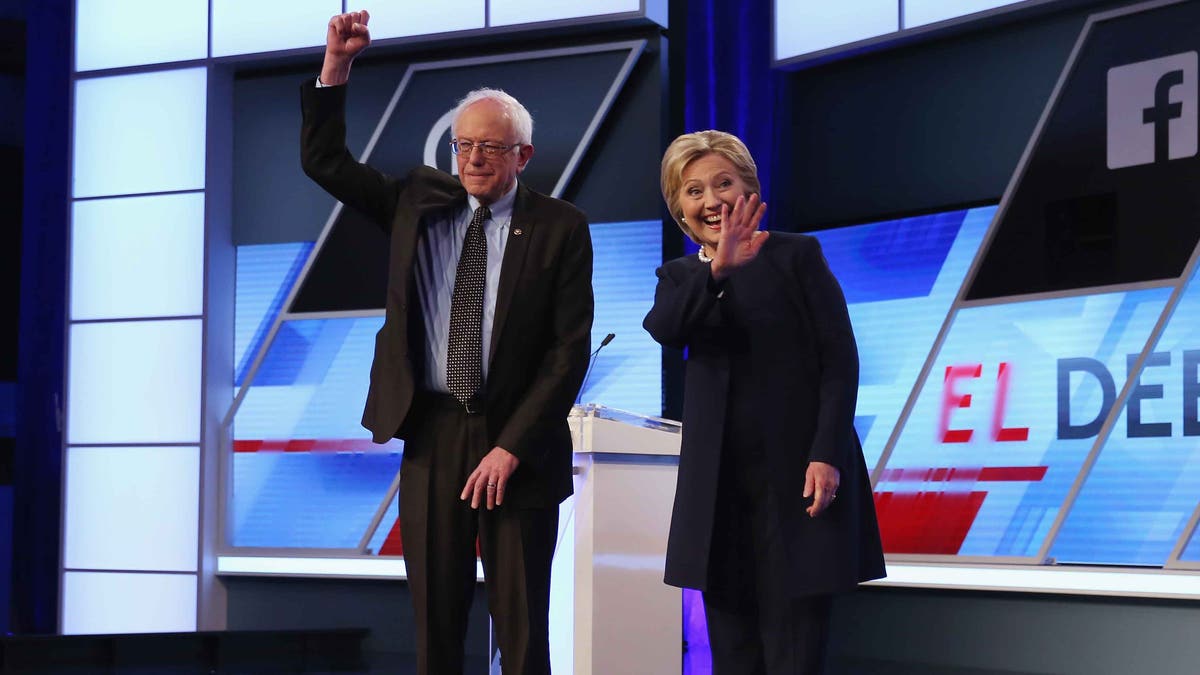
Presidential candidates Senator Bernie Sanders and Hillary Clinton on March 9, 2016 in Miami. (2016 Getty Images)
OLYMPIA, Wash. (AP) – Tens of thousands of Democrats in Washington state will meet at schools, libraries and community centers at statewide caucuses this weekend to voice their preference for their party's presidential nominee.
Party officials expect a strong showing at the caucuses that begin Saturday morning, even though the Democratic nomination process has lacked much of the drama of the Republican contest. Results are expected by the afternoon.
Washington has 118 delegates at stake, with 101 to be awarded proportionally based on the results of Saturday's caucuses. The remaining 17 are technically unpledged party and elected leaders, though a majority of them — including Gov. Jay Inslee and the state's congressional delegation — have already said they support front-runner Hillary Clinton.
The caucuses, which fall on the same day as Democratic caucuses in Alaska and Hawaii, come nearly a month after Super Tuesday. Delegate-rich New York, Pennsylvania and California are among more than 20 states that still have primaries or caucuses to hold.
"Whatever happens, Washington is not going to be a game changer," said Todd Donovan, a political science professor at Western Washington University.
Clinton has taken a strong lead in the delegate race, having won 1,223 pledged delegates so far in primaries and caucuses, according to The Associated Press' count. U.S. Sen. Bernie Sanders has won 920 delegates.
When factoring in superdelegates — party officials who can back any candidate they wish — Clinton holds a 1,690-946 lead. It takes 2,383 delegates to win the nomination.
The race has been competitive enough to draw the candidates to Washington state in the past week, with Sanders holding rallies in three cities Sunday, and Clinton and her family holding events as well. Sanders returned to the state Thursday for rallies in Spokane and Yakima, and another rally is set for Friday in Seattle.
"Washington has typically been treated as a cash machine for the campaigns and not much else for the last few campaign cycles," independent pollster Stuart Elway said. "To have them here as campaigning candidates is bound to increase the interest in the whole process."
Sanders has raised $2.6 million in the state, while Clinton has raised about $2 million.
Washington has both a presidential primary and a caucus system, but Democrats ignore the primary and use only the caucuses to allocate their delegates to candidates at the national convention. Republicans will award 44 Republican National Convention delegates based on the May 24 primary.
Fourteen will be awarded proportionally based on the statewide vote, and 30 will be allocated proportionally based on the results of the vote in each of the state's 10 congressional districts. Republicans held precinct caucuses last month but mainly focused on party platform and electing delegates to county and legislative district conventions.
More than 90,000 people have preregistered for the Democratic caucuses as of Thursday morning, though it is not required to participate, state party spokesman Jamal Raad said. In addition, about 35,000 people voted in advance due to conflicts with work schedules, religious observances, illnesses, disabilities or military service, Raad said.
The party had a record 250,000 people turn out for the caucuses in 2008, when President Barack Obama handily beat Clinton.
Even if that number is reached again, it's a fraction of the state's 4 million registered voters. But Raad said the caucuses serve as both a party building and community building event.
"It's an incredible opportunity to get folks motivated and ready for the big election," he said. "This is more active participation."




